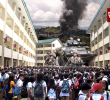The death of President Benigno ‘Noynoy’ Aquino III saw the public mourn a leader they once jeered for the failures in his administration. Perhaps given the public’s exhaustion of this current administration’s pandemic response with a lockdown that has hurt the economy, and the continuing human rights violations, they must have seen PNoy’s administration and character as a better part of history.
But the legacy of PNoy needs more scrutiny. More than judging his character, his policies and decisions need to be held as part of evaluating history and also looking ahead for leaders to answer the questions of social justice and peace particularly in Mindanao.
Bangsamoro, Zamboanga, Mamasapano
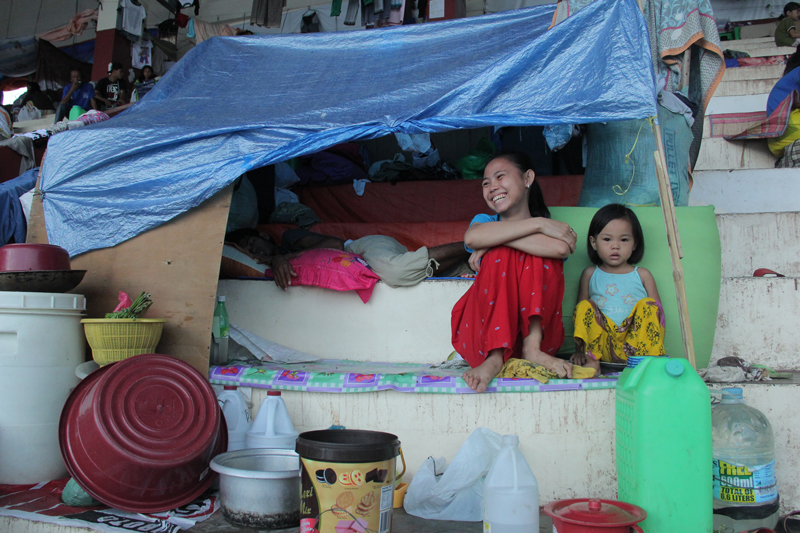
Older sister smiles while younger sister stares emptily at their evacuation center in Zamboanga City’s Enriques Memorial Complex, two months after the Zamboanga siege. (davaotoday.com photo by Ace R. Morandante)
His legacy for Mindanao was forging the long-sought peace and autonomy for the Bangsamoro people. His meetings with the Moro International Liberation Front (MILF) leader Al Haj Murad Ibrahim in Tokyo and later in MILF territory in Cotabato were historic, as it paved the way for the 2012 signing of the the Framework Agreement on the Bangsamoro (FAB) and the Comprehensive Agreement on the Bangsamoro (CAB) in 2014, which led to the creation of the Bangsamoro Autonomous Region in Muslim Mindanao (BARMM).
But this quest for peace was rocked by the Zamboanga Siege in September 2013, led by the Moro National Liberation Front (MNLF) faction of Nur Misuari that questioned the MILF peace deal in light of the Final Peace Agreement he signed in 1996 that granted the Moro people its first autonomy. The standoff lasted around two weeks, displacing 109,000 in Zamboanga and another 19,000 in nearby Basilan island (UN report).
Related: It was military strike since day One — Aquino
In January 25, 2015, a covert military operation called Oplan Exodus launched in Mamasapano, Maguindanao province took down Zulkifli Bin Hir alias Marwan, an alleged international terrorist wanted in the US, resulting to the deaths of 44 members of the Special Action Force (SAF) that launched the attack. Six Moro civilians were also killed, along with 37 MILF fighters. The incident affected the implementation of the CAB.
The Ombudsman ordered the filing of criminal and administrative charges against Aquino and heads of the Philippine National Police (PNP) and SAF for their liability on the incident.
Aquino admitted there was “lack of coordination” between government forces and the MILF that led to the incident. The president’s absence to receive the bodies of the 44 SAF fighters arriving at the Villamor Air Base was criticized. A meeting with family members of the SAF victims did not turn out well.
Lumad killings

SAMARCA FAMILY. The family of Emerito Samarca take their last glimpse of their father at the Butuan Garden Memorial Park in Bancasi, Butuan City.
Indigenous peoples in Mindanao, known as the Lumad, have challenged Aquino to take a stand on the killings of their people and to protect their ancestral domain.
On September 1, 2015, the paramilitary group Bagani Force killed Emerito Samarca, director of the Lumad secondary school ALCADEV in Lianga, Surigao del Sur, and shot dead two Manobo community leaders, Dionel Campos of Mapasu and Datu Bello Sinzo.
When then Local Government Secretary Mar Roxas visited the evacuation site of the community, there was no commitment by the secretary to address the issue of the paramilitary and the protection of Lumad schools.
The concerns of the Lumad had been raised through yearly protest caravans called “Manilakbayan” during the Aquino administration. The activities raised concerns of attacks on Lumad schools and communities, and ancestral lands which possess mineral resources exploited for mining.
As early as 2012, Lumad and peasant leaders launched a “Manilakbayan” protest caravan that engaged national leaders to address these concerns. The contingent were dismayed when then Justice Secretary Leila de Lima prioritized the visit to areas hit by Typhoon Pablo in Mindanao over meeting with them.
The Aquino administration failed to resolve the murder of Fausto Tentorio, PIME (Pontifical Institute for Foreign Missions), an Italian missionary serving the Lumad in North Cotabato for three decades, who was shot in his parish in Arakan, North Cotabato on October 17, 2011.
Mining, agribusiness
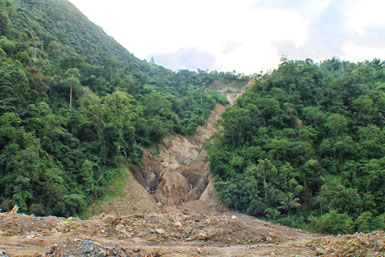
LANDSLIP. The landslide in this part of Masara mountains in Maco town, Compostela Valley last year, according to locals, was caused by the continuous excavation of Apex Mining Corporation, a foreign large-scale mining firm. (davaotoday.com photo by Ace R. Morandante)
Another legacy of PNoy that struck a different chord on Mindanaoans was his promotion of large scale mining and agribusiness.
Aquino issued Executive Order (EO) 79 in July 2012 with the intent of “reforming the mining sector” through “responsible mining.” But environment advocates saw this as a dangerous compromise. At that time, 40 of the 81 provincial governments had banned large-scale mining in its areas. One of the main concerns was how this executive order revived hopes of the SMI (Sagittarius Mines) / Xstrata in Tampakan, South Cotabato which had an existing contract.
Aquino’s EO 79 suspends the granting of new mining agreements such the Mineral Production Sharing Agreement, Joint Venture Agreement and Co-Production Agreement — “until mining laws are amended.”
Aquino also promoted agribusiness during the launch of the Mindanao Inclusive Agribusiness Program in 2013, which was implemented by the Philippine Business for Social Progress (PBSP) and Mindanao Development Authority (MinDA).
The program prioritizes coffee, cacao, corn, palm oil and rubber production.
Investors such as Nestle Philippines, Bali Oil (Indonesia) and Kennemer Foods International expressed interest in these investments which were projected to generate 120,000 jobs in Mindanao and Visayas.
The program was criticized by Bagong Alyansang Makabayan for promoting foreign ownership and exploitation of labor and natural resources.
Pablo
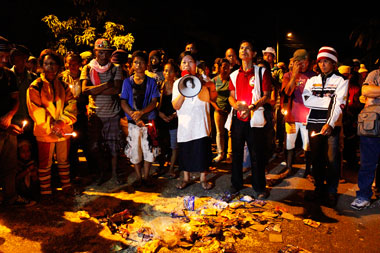
NIGHT VIGIL. By nightfall, typhoon Pablo victims continue their vigil at the DSWD Regional Office in Davao to demand the relief goods promised by the department. Here, a Catholic nun gives her solidarity message.(davaotoday.com photo by Medel V. Hernani)
While the Aquino administration is rocked by its failed response to Supertyphoon Yolanda (Haiyan) in the Visayas, an earlier typhoon in Mindanao affected the people’s perception of his administration.
On December 4, 2012 Typhoon Pablo hit Davao Region the worst. Survivors, mostly farmers who lost their farms, were dismayed at the government’s delay in housing projects that were remote from their farmlands.
The National Housing Authority (NHA) admitted that there was shortage of 13,525 housing units for the survivors in Davao de Oro (formerly Compostela Valley) and Davao Oriental.
Mixed economic performance
While the Aquino administration once boasted a 7.8% growth rate in the Philippine economy, this did not translate to a better life to people, especially in Mindanao provinces with high poverty rates, inflation and unemployment felt in his term. His continuation of the conditional cash transfer program was seen as a “band aid solution” to poverty alleviation without addressing unemployment.
There was also the issue of the privatization of power supply in Mindanao that affected all sectors from business to residents.
Mixed legacy
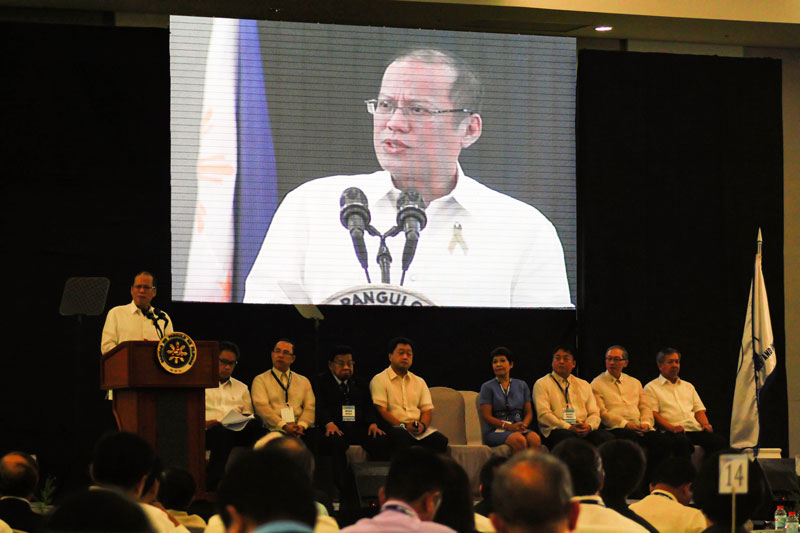
AQUINO AT MINBIZCON
President Benigno Aquino III delivers his keynote to the Mindanao Business Conference in SMX Convention Center in SM Lanang on August 8, saying his government is focusing on peace, power reform and tapping potential on Mindanao’s agriculture, tourism and infrastructure. (davaotoday.com photo by Ace R. Morandante)
Noynoy Aquino rose to the presidency in 2010 on a wave of public support after the death of his mother, People Power icon Corazon, and buoyed by his campaign line of good governance and ‘’Daang matuwid.’’
Six years later, the results had been mixed. The dissatisfaction among Mindanaoans on the Aquino government swung to supporting Rodrigo Duterte in 2016, who promised to “correct historical wrongs” in Mindanao, and instill a federal government that would re-channel the nation’s economic gains fairly to Mindanao.
Duterte’s win may have gotten one million more votes than Noynoy did in 2010, 16.6 million to 15.2 million, but Noynoy had the higher percentage of 42% compared to Duterte’s 39%. Whatever shortcomings or accomplishments left by Aquino has been exacerbated by Duterte.
Duterte’s rhetoric to “correct historical wrongs” is wiped out by the airstrikes that destroyed Marawi in 2017 that displaced 300,000 people.
Moro Consensus Group chairperson Drieza Lininding told Mindanews that Aquino was different than other presidents in regard to forging peace. “… compared to others, I think he was the only one who did not launch a war against Moro communities or did not kill Moros unlike now.”
The Aquino administration dodged the issue of human rights violations and militarization committed against the Lumad. Now this has intensified under the Duterte administration. The Save Our Schools (SOS) said around 200 Lumad schools in Mindanao were forcibly closed upon instigation of the National Task Force to End Local Communists Armed Conflict (NTF-ELCAC( by red-tagging the schools, as more Lumad and peasant leaders and even students were murdered by soldiers and paramilitary.
Mining and agribusiness also continue under Duterte. The moratorium on open pit mining was lifted last April 2021 through Executive Order (EO) 130 which would grant 291 mining permits to resume operations. He has also actively promoted agribusiness and offered this to Lumad communities as alternative to their opposition to open-pit mining.
From ‘’Daang Matuwid to “Change is Coming,” the rhetoric of failed promises has made the road to progress in Mindanao uneven and torturous.

